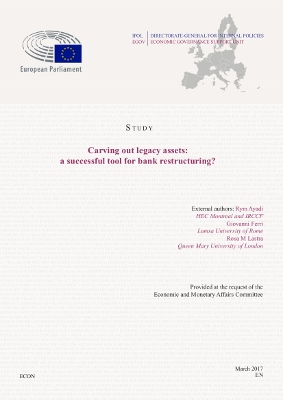Author(s): Rym Ayadi, Giovanni Ferri, Rosa M. Lastra
Subject: State aid, single resolution mechanism, European policies
Date of publication: March 2017
Rym Ayadi, Giovanni Ferri and Rosa M. Lastra consider in this paper a number of issues related to the restructuring of troubled banks in the European Union.
First, this article provides an overview of how legacy assets have been dealt with in a number of countries (in particular, drawing upon the experiences in Japan, the USA, Sweden and Spain), which support the case for a centralized solution in the presence of a generalized banking crisis.
Second, it sheds light on the need to differentiate between systemic and non-systemic events, by examining the relevant literature on the credit channel.
Third, it elaborates the theoretical argument on the need for a systematic centralized approach at the EU level to deal with legacy assets in bank restructuring in order to maintain fair recovery rates.
Finally, it provides a preliminary assessment of the business models, risks, of the response to regulation and performance of 38 state aided banks via recapitalization measures and explicit restructuring requirements, with an emphasis on APS-AMC arrangements using available data between 2005 and 2015. The indicators show that these state aided banks are only returning progressively to soundness but struggle to regain their pre-crisis performance levels , a generalized problem throughout the European banking sector.
This material was originally published in a paper provided at the request of the Committee on Economic and Monetary Affairs of the European Parliament and commissioned by the Directorate-General for Internal Policies of the Union and supervised by its Economic Governance Support Unit (EGOV). The opinions expressed in this document are the sole responsibility of the authors and do not necessarily represent the official position of the European Parliament. The original paper is available on the European Parliament’s webpage. © European Union, 2017. Copyright remains with the European Union at all times.

